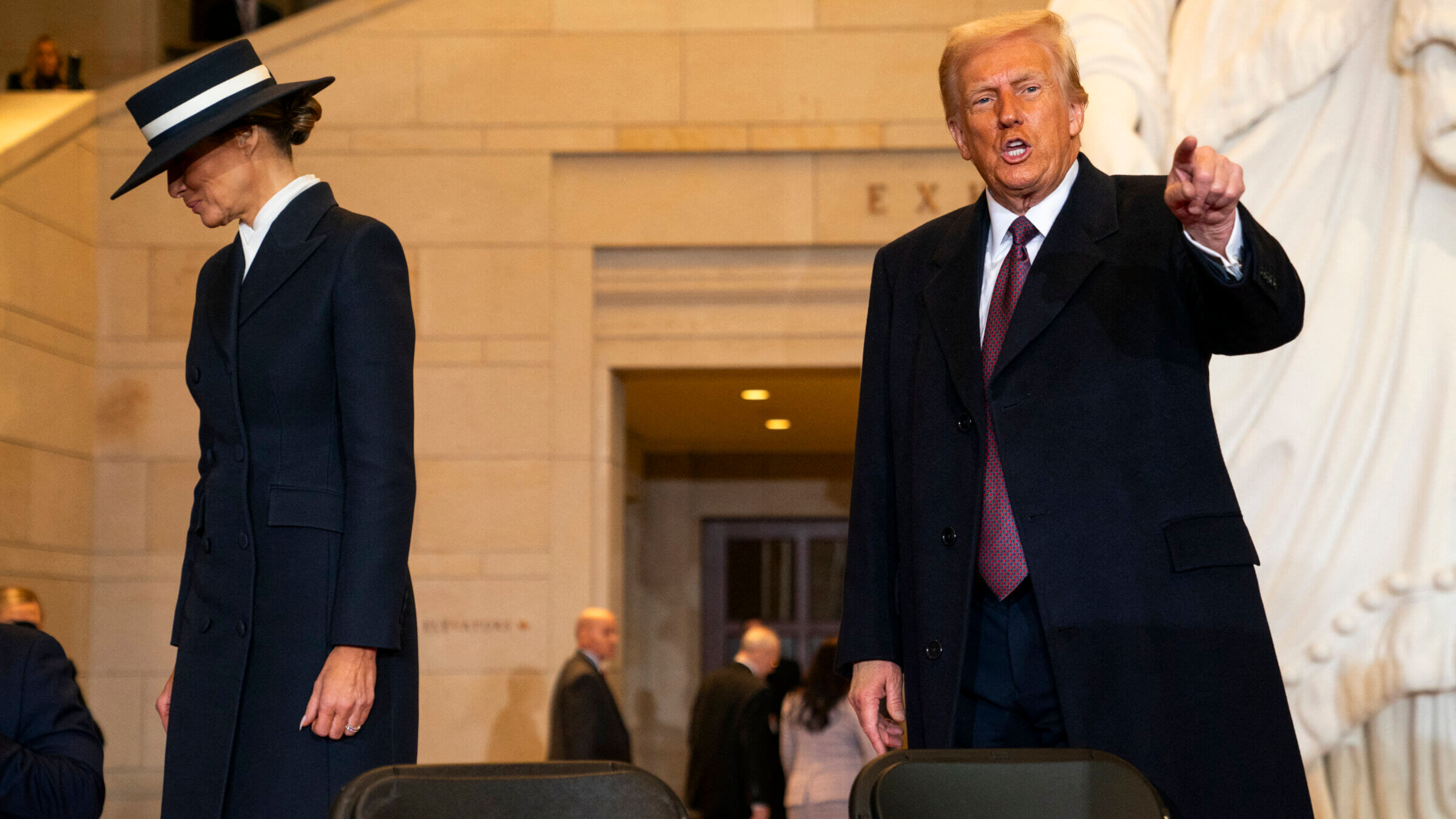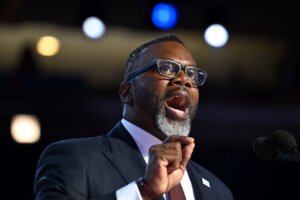Trump, Netanyahu and Ta-Nehisi Coates want us to believe the world is simple — it isn’t
Slogans uttered at the inauguration and elsewhere belie the complexities we need to face

Donald Trump after the inauguration ceremonies. Photo by Getty Images
For many of us who are normally eager to share our words, this is a time of wordlessness. It’s hard to separate all the feelings — the elation over the release of three young women hostages to Israel after 471 days in captivity, the sadness and anger over all those who will not be returning home after 15 months of war, and the uncertainty many of us feel toward our leadership, whether it is in the United States, Israel, or Europe, all of which seem to be struggling in the face of a rising far right.
And of course, today, President Donald Trump was inaugurated, for the second time.

“Yes, can we talk about something else?” Chicago’s Mayor Brandon Johnson said on NPR today after journalist Sasha Ann Simons switched the topic from how Chicago will handle the new Trump administration and its promise to start deportations tomorrow to the mayor’s thoughts on Martin Luther King Jr. Day.
It occurred to me that many of us wish we could talk about something else, anything else, instead of the second Trump inauguration. But that same sentiment, and its close cousin — “when will we ever be able to think about something else?” — has been the Jewish people’s primary experience since Oct. 7, 2023.
In the tense lead-up to Hamas’ announcement of whether they would accept the deal, and then their delay in naming the actual hostages, I watched a documentary in Hebrew, on Israeli television, featuring Kfir Bibas’ grandfather searching for the child’s stuffed elephant, now famous around the world from his hostage poster.
It was clear that the grandfather felt that finding the elephant would mean being able to do something, anything. He wanted to be ready in case the little boy miraculously came home. But it was also clear — as the older man broke down in tears — that he has not been able to think or talk about anything other than the fate of his son, daughter-in-law, and two grandsons.
Who knows why it took so long for the same ceasefire deal that had been floated for months to take hold, and as hostages and Gazan civilians lost their lives in the wait?
Many in Israel blame Benjamin Netanyahu. President Joe Biden said this was the hardest negotiation he has ever been a part of. President Trump, naturally, takes all the credit.
What we do know is that this is an American presidential inauguration enthusiastically attended by Europe’s far-right, including Italian prime minister Giorgia Meloni and representatives from Germany’s AfD party — while former first lady Michelle Obama did not attend. And while I share Mayor Johnson’s desire to talk about something else, and while I completely understand Michelle Obama’s choice to sit this one out, let’s talk for a bit about Trump’s inaugural address and its language.
One sentence stood out to me. It was the fourth sentence President Trump uttered after his thank-yous. He said: “I will, very simply, put America first.”
Trump has won a lot of votes by convincing people that the solution to complex problems is simple.
Immigration? Build a wall.
Hostage crisis? Make a threat.
But usually, his solution is simply himself, as in his promise “I alone can fix it.”
“Putting America first” may sound reassuring to those who don’t know its history. But the phrase is associated with the America First movement, whose most prominent member was Charles Lindbergh. In this era when history is forgotten, let’s remember what Lindbergh said as Jews were being murdered in Europe.

“The Jews are one of the principle forces attempting to lead the U.S. into the war,” Lindbergh said in a rally in September 1941. “The Jews’ greatest danger to this country lies in their large ownership and influence in our motion pictures, our press, our radio and our government.”
The America First movement fell apart after Pearl Harbor. But the phrase “America First” still chills many Jews.
The phrase actually goes back to the 1880s, when it was a Republican slogan.
“It didn’t enter the national discussion until 1915, when Woodrow Wilson used it in a speech arguing for neutrality in World War I. That isn’t the same as isolationism, but the phrase got taken up by isolationists,” historian Sarah Churchwell, author of Behold, America, told Smithsonian magazine.
“Wilson was treading a very fine line, where there were genuine and legitimate conflicting interests. He said he thought America would be first, not in the selfish spirit, but first to be in Europe to help whichever side won. Not to take sides, but to be there to promote justice and to help rebuild after the conflict. That was what he was trying to say in 1915.”
Interestingly, “America First” was the campaign slogan of both Republicans and Democrats in that era. Harding and Coolidge, both Republicans, ran on “America First” in 1920 and 1924. “These were presidential slogans, it was really prominent, and it was everywhere in the political conversation,” Churchwell said.
Presidential slogans matter. And here we are, going back to the past, with an old slogan, and an old isolationist attitude; with the old far-right of Europe showing strength in Italy and Germany and elsewhere. And here we are, with the great promise of dictators, that everything is simple.
It may seem that in our era, having Republicans and Democrats agree on the same slogan is impossible. Yet I keep hearing leaders on all sides turn to simplicity.
Mayor Johnson, for instance, quoted King’s idea of “three evils” — war, poverty and racism. But where does that leave the concept of a just war? Would it have been best to just let Hitler rule Europe until he murdered every Jew on the continent? Would it be appropriate to not attack Hamas?
And it’s not just political leaders, but leading cultural figures, trying hard to convince us that simplicity explains everythiung.
Ta-Nehisi Coates argues in his bestselling book that the Israeli-Palestinian conflict is simple to understand. “Indeed, he has declared that complexity itself is to be rejected in favor of black-and-white morality, Israel being the bad guys and the Palestinians the good guys,” as Jonah Goldberg observed in the Los Angeles Times. “According to Coates, the very idea that the Israeli-Palestinian conflict is ‘complicated’ is a way of shielding Israel from the condemnation it deserves.”
When I read Coates’ framing, all I could think was that it was Trumpian. It was just coming from the left, not the right. And that’s why Trump’s “put simply” chilled me so much — because the desire to talk about something else, a close cousin of the desire to see the world as simple, is something the left and right agree on.
And because the lie of simplicity makes it possible to avoid real and difficult solutions.
The way forward for those of us who do not live in the past is to acknowledge complexity, even when it is painful — and to recognize that figures on both the right and the left are urging us to see that the world is simple, when it is not. In the years ahead, we will need to fight against the concept of “America First,” which evades this country’s responsibility to the world. But we also need to battle against this appealing-sounding language — “put simply.”
It’s not simple to exchange hostages for those who murdered Americans and Israelis on buses in the 1990s — who will now be free to kill again. I remember those young people, just taking a bus in Jerusalem. And on other fronts, it’s not simple to actually deal with climate change, or homelessness, or the widening gap between the rich and the rest.
Of course we would like to talk about something else, something pleasant. But we have no choice but to show up, acknowledge all the layers of truth and lies, and wade through.
A message from our Publisher & CEO Rachel Fishman Feddersen

I hope you appreciated this article. Before you go, I’d like to ask you to please support the Forward’s award-winning, nonprofit journalism so that we can be prepared for whatever news 2025 brings.
At a time when other newsrooms are closing or cutting back, the Forward has removed its paywall and invested additional resources to report on the ground from Israel and around the U.S. on the impact of the war, rising antisemitism and polarized discourse.
Readers like you make it all possible. Support our work by becoming a Forward Member and connect with our journalism and your community.
— Rachel Fishman Feddersen, Publisher and CEO





























